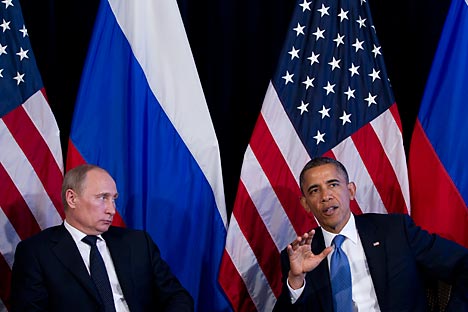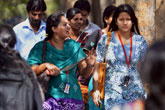Who do Indians like: Russia or USA?

Contentious surveys aside, Indians tend to favour Russia over the US. Source: AP
Do Indians look at the US more favourably than Russia? That would be counter-intuitive considering the Americans are firmly in the Western camp, which is often hostile towards India whereas Moscow is New Delhi’s strategic partner and long-time friend. But according to the latest Pew Research Center survey, “In general, Indians are positively disposed toward the US.”
The March 2014 survey titled ‘Indians Reflect on their Country & the World’, claims a majority (56 percent) of Indians have a favourable view of America, while 15 percent hold a very unfavourable sentiment. In comparison “Russia, a strong ally of India during the Cold War, enjoys a 45 percent favourable rating, with 23 percent of the public holding an unfavourable view”.
What explains the 11 percent lead the US has over Russia? How could the US, which continues to view the county of 1200 million through the colonial lens, conducts massive spying against India and publicly humiliates Indian diplomats, be in Indians’ good books? Clearly, something is amiss here.
This writer asked a seasoned pollster at a leading Indian opinion poll company if such surveys are bias-free. “It depends who you speak to and whether the organisation commissioning the survey has an agenda,” he said. “For instance, some of our media clients have asked us to tweak results in a particular political party’s favour. We can’t say no because the media is a small industry and soon we’ll have no clients left.”
Given the fact Pew is a US company catering for an American audience, some bias is expected. And because the US media is beholden to its corporate masters and shamelessly flacks for the military, Pew surveys won’t get a wee mention in the mainstream press if they deviate too far from the American narrative.
Holes in the survey
This isn’t the first time Pew has acted fishy. In its September 2013 survey on Global Opinion on Russia, it talked to people in 38 countries but left India out, with the following footnote: “Results for India are not reported due to concerns about the survey’s administration in the field.”
What did Pew find? Whatever it was, the omission is unprecedented – and suspicious. The survey claimed that worldwide a median of just 36 percent expressed a positive opinion of Russia. Yet several major Asian countries were positively disposed towards Moscow. For instance, in South Korea 53 percent were in favour, in China the figure was 49 percent, Indonesia 43 percent, and Australia 42 percent.
If nearly half of Chinese polled had a positive opinion of Russia, then the figure from India – which Russia has defended with military might – would surely have been a lot higher. So if overwhelming numbers of Indians had expressed a positive opinion, then India’s inclusion would have tilted the median in Moscow’s favour. And upended Pew’s agenda, if any.
Underhanded tactics
In the latest survey, Pew has achieved the miracle of favourable Indian opinion about the US by removing Russia from the equation and comparing – or rather contrasting – the US with India’s chief competitor China and enemy Pakistan.
One of the questions asked was “Do you want strong ties with China or the US”? Predictably 42 percent of Indians chose the US with just 9 percent picking China. How difficult is that?
To the same above question, 21 percent said the US is neither a partner nor an enemy. And 26 percent had no opinion. So basically 47 percent of Indians nationwide did not answer that question because they were put off by the choices offered.
Pew is simply using a tested trick from the propaganda handbook. From a survey on Russia it removes Indians’ opinion and in a survey on Indians it takes out the Russian option. Neat.
Snake oil
According to Pew, another reason Indians’ views of the US are relatively positive may be that “they do not see Washington as acting unilaterally in foreign policy”. “More than half (56 percent) of those surveyed express the opinion the US takes into account the interests of countries like India in making international policy decisions.”
Seems like some of those Pew surveyed were either on drugs or brain dead. For, when was the last time the US sought India’s opinion on a matter of international importance? How about never?
Other than pollster bias, there could be another explanation for Indians’ bizarre views. For that we’ll turn to another survey, by the Delhi-based Centre for the Study of Developing Societies. In that survey conducted in 1999 – only one year after the Pokhran atomic tests – 53.5 percent of India's electorate had never heard of the nuclear tests. Incredibly, 35.6 percent of the respondents had never heard of China, India’s biggest neighbour. It’s like Americans not knowing about Canada’s existence.
So what gives? Indians, or at least the mall crawling species – those most likely to be approached by pollsters – are perhaps becoming an increasingly me-focussed generation that can’t be bothered about global happenings.
Influence peddlers
Again, Pew’s claim that 65 percent of well to do Indians and 61 percent of urbanites are pro-American simply does not wash. Yes, a large number of urban Indians have close relatives living or studying in the US. American universities and corporations are still the go-to places for Indians wanting to supersize their resumes. That is the only sense in which the US evokes positive feelings among some – but certainly not all – Indians. A US green card is not the aspirational thing it was in the last century.
Except for a minority of urban Indians, who author Rajiv Malhotra describes as sepoys – Indian soldiers serving the English army to fight other Indians – most Indians view the US and the West as harbouring ignoble intentions. In fact, the defining belief among Indians is the US and its cohorts do not welcome India’s rise.
The fact that billions of dollars in aid money flows into India for conversion of poor Indians in the troubled Naxalite belt in southeastern India, and that nearly all of this money comes from evangelistic churches in the US, Germany, UK, Italy, the Netherlands, Spain, Switzerland, Belgium and Australia are evidence of the multi-pronged Western gambit to weaken India’s foundations.
Malhotra in his book ‘Breaking India’ gives evidence of this Western attempts to destabilise India: “What I found out should sound the alarm bell for every Indian concerned about our national integrity. India is the prime target of a huge enterprise – a ‘network’ of organisations and individuals – that seems intensely devoted to the task of creating a separatist identity, history and even religion for the vulnerable sections of India. The research tracked the money trails that start out claiming to be for ‘education’, ‘human rights’, ‘empowerment training’, and ‘leadership training’ but end up in programmes designed to produce angry youths who feel disenfranchised from Indian identity.”
At the same time, Russia is not even remotely connected to anything anti-India. So any Indian who favours the West over Russia is either uninformed, brainwashed or on the take. According to Saurabh Shukla, a member of Citizens for Accountable Governance, Indians influenced by Westerners “take orders and finance from foreign masters and work continuously to undermine India’s integrity. They are also rewarded with fellowships, awards and foreign trips by the foreign masters to feed their ego. The trend is very alarming.”
Clearly, whether it is the consistent demonising of India as the “biggest pain in Asia” or the envy spewing out at India’s Mars and moon missions, the US and the West have never been true friends of India.
Survey or no survey, that impression won’t change. For, that’s not opinion, that’s fact.
All rights reserved by Rossiyskaya Gazeta.
Subscribe
to our newsletter!
Get the week's best stories straight to your inbox




